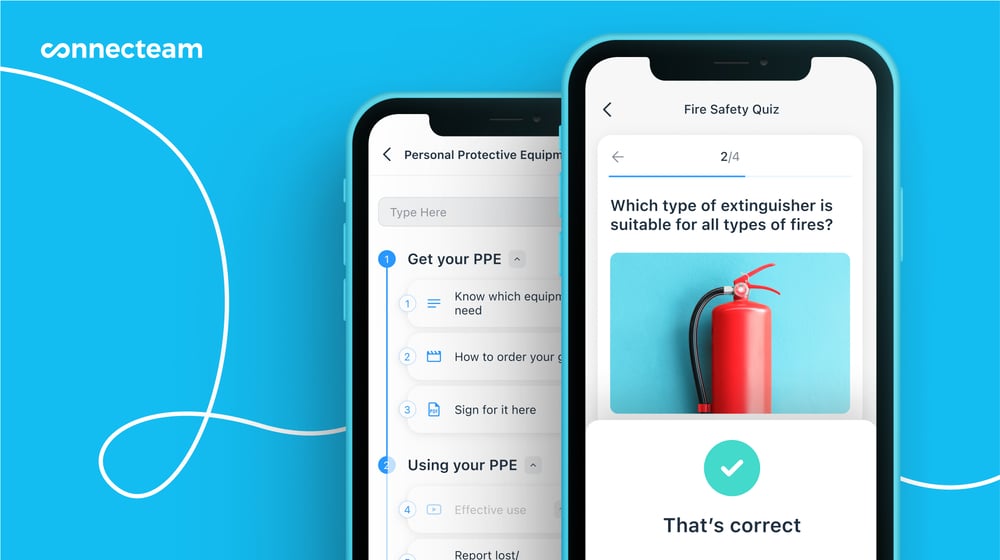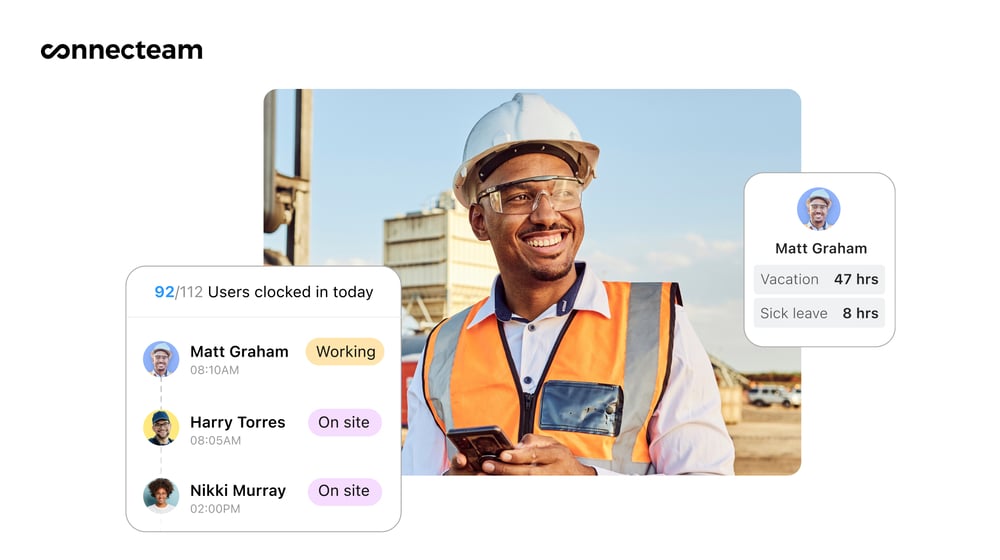Starting a construction company is exciting, but without the right know-how, legal setup, financial planning, and operational systems, even skilled builders can struggle to turn their trade into a thriving business.
To succeed, you must navigate licensing, secure insurance, manage finances, build a capable team, put systems in place to keep projects running smoothly, and more.
Below, I break the process into a clear checklist that includes everything from licensing requirements and tools to marketing necessities and essential software solutions.
Key Takeaways
- Starting a construction business involves researching the market and registering your business.
- You should be aware of licensing, permitting, and certification requirements.
- Skilled workers, reliable subcontractors, and clear onboarding processes keep projects on schedule and up to standard.
- Quality hand tools, power equipment, and safety gear boost efficiency and reduce downtime.
Starting Your Own Construction Company: A Master Checklist
When you’re an employee, it’s enough to be a great builder, but as the boss, you must know how to run the entire operation. This checklist breaks down what you need and steps you must take to launch your construction business, stay compliant, and keep every project on track.
Skills
The qualifications you need to start a construction company include various skills, from trade-specific skills to leadership abilities. Here are some of the skills your business might need.
Hard skills
- Construction project management (scheduling, budgeting, procurement).
- Blueprint reading and interpretation.
- Knowledge of building codes, zoning laws, and permitting processes.
- Trade skills such as carpentry, masonry, electrical, plumbing, or concrete work.
- Estimating and bidding skills to win profitable contracts.
- Site safety management and OSHA compliance knowledge.
Soft skills
- Leadership and crew management.
- Problem-solving and adaptability on the job site.
- Clear client communication and relationship management.
- Negotiation skills for working with vendors and subcontractors.
- Time management and multitasking across multiple projects.
Planning and research
Before investing your valuable time and money, you should understand where your business fits in the market and how you’ll compete. A clear plan reduces costly mistakes and sets the foundation for long-term growth.
Here are the steps to take.
Define your niche
Decide on which type of construction business you’ll focus on:
- Residential.
- Commercial.
- Industrial.
- Public works.
- Renovation and remodeling.
- General contracting.
- Specialty contracting.
- Green and sustainable.
Conduct market research
Here’s what to analyze:
- Competitors.
- Demand.
- Pricing trends.
- Potential gaps in your area’s construction services.
Write a business plan
In your business plan, you should outline your:
- Construction services.
- Target clients.
- Pricing model.
- Marketing approach.
Test feasibility
Here’s how to determine if your company can realistically get off the ground:
- Compare startup costs with available capital.
- Estimate projected revenue based on demand.
- Identify areas to cut costs or delay purchases if needed.
- Explore funding options (loans, investors, grants) if capital falls short.
- Ensure projected revenue covers not just startup costs but also ongoing expenses (payroll, insurance, equipment maintenance).
Business registration
Select a business structure
Different business structures have different tax, liability, and compliance obligations. Choose from:
- Sole proprietorship.
- Partnership.
- Limited liability company.
- Corporation (S corp or C corp).
Register your business name
- Make sure your chosen name is available.
- Register it with the relevant authority (e.g., your state’s Secretary of State office).
- Consider trademarking for added protection.
Licenses, certifications, and permits
The licenses you need to start a construction company depend on your state, the services you offer, and where you’re located. Many businesses require a general contractor’s license, while others also require trade-specific licensing for electrical, plumbing, or HVAC work.
Licenses
These are often required at the business level (firm-wide) and sometimes at the individual level.
- Business license: Required by most cities or counties before you can offer services.
- General contractor license: Needed in many states before you can oversee projects (often requires exams, insurance, and proof of experience).
- Specialty contractor license: Required for trades like electrical, plumbing, roofing, or HVAC.
- Equipment operator license: May be needed for the operation of cranes, bulldozers, or excavators.
Did You Know?
Connecteam’s Documents feature helps you store all regulatory, formal, and personal files securely in one place. Set expiration dates for each document or document type and automatically notify employees when it’s time to renew their documents.
Certifications
- Proof of OSHA safety training: Required by some states (for instance, Nevada requires completion cards for approved OSHA training).
- First aid & CPR certification. Required by OSHA for construction sites where reasonable access to medical services is absent, in which case, someone at the worksite must hold a valid certificate. (Some states may have stricter requirements.)
- Project management certifications. Not legally required, but some clients (e.g., large commercial developers) or project owners (e.g., government agencies) may require or strongly prefer a certified project manager as part of the bid or contract.
- Other certifications: Sometimes required. For instance, environmental certifications—EPA RRP firm certifications (for firms) and Lead Abatement Certification (for individuals) are required for renovations involving lead paint removal, encapsulation, or other abatement activities in houses and child-occupied facilities built before 1978.
Permits
- Building permits for most construction, renovation, and demolition projects.
- Zoning/land use permits for compliance with local zoning laws and land-use restrictions.
- Health & safety permits for activities like scaffolding setup or asbestos removal.
- Environmental permits to regulate impacts like stormwater runoff or waste disposal.
Pro Tip
Talk to state and local licensing authorities, legal advisors, or trade organizations such as Associated Builders and Contractors to learn the exact licensing, certification, and permitting requirements for your trade and location.
Insurance and bonding
Unexpected accidents, property damage, or disputes can quickly affect a project and your bottom line. The right insurance and bonding protect your company, reassure clients, and are often mandatory for securing contracts. These include:
- General liability insurance: Covers third-party injuries or property damage on the job.
- Workers’ compensation: Required in most regions if you have employees; covers workplace injuries and lost wages.
- Builder’s risk insurance: Protects materials, equipment, and incomplete structures against theft, fire, or weather damage during construction.
- Vehicle and equipment coverage: Safeguards your fleet and expensive tools from loss or damage.
- Surety bonds: Guarantee contract completion and protect clients financially if obligations aren’t met.
Financial setup
Solid financial systems are the backbone of a sustainable construction business. From funding your first projects to paying your team on time, careful setup helps you avoid cash flow issues and keeps your operations running smoothly.
- Secure startup capital: Calculate how much it will cost to start your construction business, including expenses for licensing, insurance, tools, equipment, and marketing. Funding can come from personal savings, small business loans, investors, or grants.
- Get an EIN: Apply for an employer identification number through the IRS. This is required for taxes, hiring employees, and opening a business bank account.
- Open a business bank account: Keep personal and business finances separate. Choose a bank that offers low-fee accounts and business credit options.
- Set up an accounting system: Use software like QuickBooks or Xero to track income, expenses, and tax obligations.
- Set up payroll: Choose a payroll system like Gusto or Paychex for handling employee payments, benefits, and tax withholdings.
- Plan for taxes: Open a dedicated tax savings account and set aside a percentage of each payment you receive to cover quarterly or annual tax bills.
Did You Know?
Connecteam’s free employee time clock helps you track labor hours accurately and link them to specific projects. You can even integrate it with popular accounting and payroll software.
Tools and equipment
Having the right tools and equipment improves efficiency, reduces risks, and helps you deliver quality work. Start with the essentials, then add specialized gear as your projects grow. And remember you can buy or rent these (sometimes, renting is smarter).
Hand tools
- Hammers.
- Screwdrivers.
- Levels.
- Tape measures.
- Pliers.
- Wrenches.
Power tools
- Drills.
- Circular and table saws.
- Nail guns.
- Grinders.
Heavy equipment
- Excavators.
- Loaders.
- Scaffolding.
Safety gear
- Hard hats.
- High-visibility vests.
- Gloves.
- Safety glasses.
- Harnesses.
- Steel-toed boots.
Specialty tools
Pick construction tools and supplies tailored to your niche, such as:
- Tile cutters.
- Thermal cameras.
- Other trade-specific tools.
Maintenance and tracking
Your work doesn’t end when you have the tools and equipment you need. You must also:
- Keep equipment in top shape.
- Log inspections and repairs.
- Track warranties.
- Find a way to keep track of your assets.
Team and staffing
Your team is the key to finishing projects on time and to standard. Building a reliable workforce takes careful hiring, clear processes, and the right tools to manage everyone effectively.
Here’s what you must do:
Hire skilled laborers
- Find workers with proven trade experience.
- Verify licenses and certifications.
- Check references before hiring.
Build a subcontractor network
Keep trusted specialists on call, including those who can handle:
- Electrical.
- HVAC.
- Landscaping.
- Other niche trades.
Develop an onboarding process
The process should involve:
- Training new hires from day one.
- Sharing company policies.
- Reviewing safety protocols.
- Walking through standard workflows.
Did You Know?
With Connecteam, you can deliver onboarding and training straight to crew members’ phones.

Marketing and sales
Marketing your construction business strategically ensures a steady flow of projects and helps you stand out in a competitive market.
Here’s what you need to create a professional presence that builds trust and generates leads:
Logo and branding
- Create a simple, versatile logo.
- Keep branding clean, memorable, and consistent (e.g., by using the same colors and fonts everywhere).
- Protect your brand legally with a trademark registration.
Website
- Create a website and optimize it for mobile devices.
- List services clearly.
- Add a “Request a Quote” button.
- Post customer testimonials and project photos.
Social media
- Advertise to nearby local communities on Facebook and Nextdoor.
- Share project photos and stories on Instagram.
- Networking with pros on LinkedIn.
- Share quick video content on YouTube and TikTok.
Business email
- Use a domain-based address (i.e., an email tied to your business website, like [email protected]).
- Separate inboxes for leads/clients.
- Set up an auto-reply for inquiries.
Operations and project management
Efficient operations and strong project management keep jobs running on schedule, within budget, and to the client’s satisfaction. Putting clear systems in place early will save time, reduce costly errors, and make scaling your business easier.
Prepare legal documents, SOPs, and more
Protect your business with clear paperwork, including:
- Client contracts for every project.
- Change order forms for scope adjustments.
- Subcontractor agreements with defined terms.
- Standard operating procedures for things like safety protocols
- Other forms (incident reports, purchase orders)
Choose systems for managing projects
- Scheduling software for assigning workers and equipment.
- Task manager for assigning work, tracking progress, and managing deadlines.
- Quality control procedures, such as inspection checklists and scheduled site reviews.
- Communication software for sharing updates and safety notices.
- Document tracking system for storing qualifications (like insurance policies and licenses) and tracking renewals.
- Asset tracking software for tracking tools and equipment.
- Job costing and estimating software for creating accurate bids and tracking profitability.
- Form creation software for creating invoices, safety manuals, etc.
- Client management software for keeping client records.
- HR system for storing employee records, responding to time off requests, etc.
Did You Know?
The Connecteam construction app offers all the systems above in a single, all-in-one solution.

FAQs
How do I get started in the construction industry?
To get started in construction, gain basic construction skills through vocational training, apprenticeships, or entry-level labor positions. Build experience in a specific trade, then work toward any required certifications or licenses.
What’s the easiest construction job to get?
General laborer positions are often the easiest entry point into construction. These roles typically require minimal formal training and focus on supporting skilled tradespeople by moving materials, cleaning job sites, or assisting with basic tasks.
Which construction trade is most in demand?
Skilled trades like electricians, plumbers, and HVAC technicians consistently rank among the most in-demand construction roles. Growing infrastructure needs, housing development, and an aging workforce mean these specialties offer strong job security and steady opportunities in most regions.


